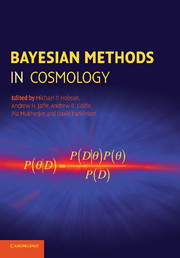Book contents
- Frontmatter
- Contents
- List of contributors
- Preface
- Part I Methods
- 1 Foundations and algorithms
- 2 Simple applications of Bayesian methods
- 3 Parameter estimation using Monte Carlo sampling
- 4 Model selection and multi-model inference
- 5 Bayesian experimental design and model selection forecasting
- 6 Signal separation in cosmology
- Part II Applications
- Index
1 - Foundations and algorithms
Published online by Cambridge University Press: 11 April 2011
- Frontmatter
- Contents
- List of contributors
- Preface
- Part I Methods
- 1 Foundations and algorithms
- 2 Simple applications of Bayesian methods
- 3 Parameter estimation using Monte Carlo sampling
- 4 Model selection and multi-model inference
- 5 Bayesian experimental design and model selection forecasting
- 6 Signal separation in cosmology
- Part II Applications
- Index
Summary
Why and how – simply – that's what this chapter is about.
Rational inference
Rational inference is important. By helping us to understand our world, it gives us the predictive power that underlies our technical civilization. We would not function without it. Even so, rational inference only tells us how to think. It does not tell us what to think. For that, we still need the combination of creativity, insight, artistry and experience that we call intelligence.
In science, perhaps especially in branches such as cosmology, now coming of age, we invent models designed to make sense of data we have collected. It is no accident that these models are formalized in mathematics. Mathematics is far and away our most developed logical language, in which half a page of algebra can make connections and predictions way beyond the precision of informal thought. Indeed, one can hold the view that frameworks of logical connections are, by definition, mathematics. Even here, though, we do not find absolute truth. We have conditional implication: ‘If axiom, then theorem’ or, equivalently, ‘If not theorem, then not axiom’. Neither do we find absolute truth in science.
Our question in science is not ‘Is this hypothetical model true?’, but ‘Is this model better than the alternatives?’. We could not recognize absolute truth even if we stumbled across it, for how could we tell? Conversely, we cannot recognize absolute falsity.
- Type
- Chapter
- Information
- Bayesian Methods in Cosmology , pp. 3 - 35Publisher: Cambridge University PressPrint publication year: 2009
- 1
- Cited by



